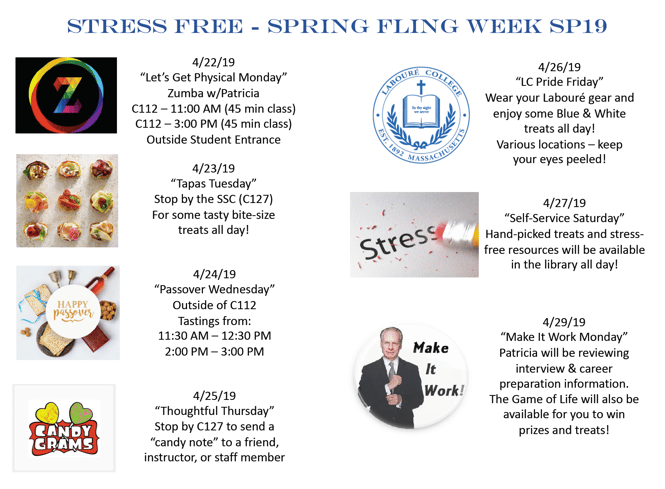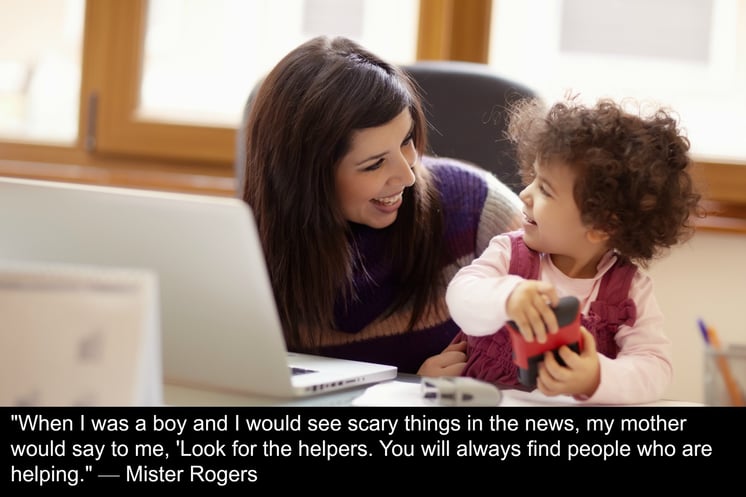April is National Stress Awareness Month. Stress affects us all at different times and in different ways, because stressors are all around us. As we wrap up the Spring semester and students are taking final exams, it is important to be aware of the stressors in our lives, how we are feeling, and making sure we practice self-care.
A little bit of stress can be exciting and healthy – like knowing that you’ll be graduating next month, or moving, or maybe starting a family or starting a new job, or taking a vacation. These kinds of stressors can be stimulating, keep you motivated, and help you achieve your goals.
Sometimes, though, the stress can become too much and overwhelm you. Personal events, illness, injury, job conflicts, or even internal thoughts and fears are stressors that cause distress and can have a negative impact on your health and well-being.
It’s important to be able to recognize the signs of too much stress, and to make sure you have the tools you need to get through it.
How do I know if I’m too stressed?
According to the Centers for Disease Control (source), some common signs of stress can be:
- Changes in your appetite
- Changes in your sleep habits
- Trouble falling asleep or staying awake
- Headaches, back pain, or stomach problems
- Anger, tension, irritability, or crying
- Wanting to be alone
- Difficulty concentrating or completing tasks
- Feeling sad, frustrated, or helpless
- Feeling fear and anxiety about the future
- Increased use of alcohol, tobacco, or drugs
What can I do to reduce my stress?
While stress is never going to go away completely, knowing how to better respond to and manage it can help reduce the negative impact stress has on your body and your mind. (source)
- Manage your time. Maybe you’re dealing with a project or deadline or juggling work, family, school, and more. Breaking it down into steps, actions, or time blocks can help you prioritize what you need to do. Try writing down on paper what you need to do; this will help you handle each item in a manageable, achievable goal that takes you to the next step.
- Eat healthy, well-balanced meals. Drinking lots of coffee, sodas or caffeine, or consuming loads of sugar might work short-term to keep you going, but you’ll feel better in the long run with healthy snacks and balanced meals. Make sure you drink lots of water to stay hydrated.
- Physical activity boosts endorphins, and endorphins are the chemicals that naturally make you feel good. Take a walk, hit the gym, or take a fitness or yoga class if you can make the time. If you don't have time for a full workout, press pause on whatever you're doing, put on your favorite song, and have a 5-minute dance party!
- Take a break. Or more accurately, give yourself a break. Taking a deep breath and focusing on inhaling and exhaling can help you feel more calm and relaxed, and can lower your heart rate and breathing if you find those have sped up. Meditation and yoga can help you focus on breathing and allow you to feel less stressed.
- Hang out with your pets or loved ones. Being around people or things that make you happy can be the mental break you need. Pets are great at knowing when you might need a little support. Give them a hug or a cuddle and you'll instantly feel a bit better.
- Talk about it. Sharing your problems and how you’re feeling with your family, friends, loved ones, or even a teacher or instructor can help. If you're not comfortable with someone that close, a counselor or a doctor can help.
- Recognize when you need more help. Self-care is a first step, but it's ok to need more than that. If you or a loved one are struggling to manage stress on your own, talking to a psychologist, social worker, or counselor can help.
During finals week at Labouré, Student Affairs is hosting several free on-campus activities for students. Check out the schedule below, come take a quick mental break, and refuel.
Feeling stressed or overwhelmed at school? Contact Student Affairs any time at (617) 322-3579 or StudentSuccess@laboure.edu.






Comments